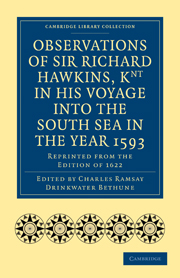 Observations of Sir Richard Hawkins, Knt in His Voyage into the South Sea in the Year 1593
Observations of Sir Richard Hawkins, Knt in His Voyage into the South Sea in the Year 1593 Published online by Cambridge University Press: 05 February 2012
Many of the early voyages to the Spanish possessions in South America, are open to the charge of having been conducted more upon buccaneering principles, than on those that should guide nations in their intercourse with each other.
Even Sir Francis Drake, on his return from one of the most memorable, endured the mortification of being considered little better than a pirate, and it required all the honors conferred on him by Queen Elizabeth, to set him right in public opinion.
This is not the proper place to discuss the question, whether England was justified in allowing such expeditions to leave her shores; it is sufficient to state, that our author is not liable to any animadversion, as his voyage was undertaken under the authority of the Queen's commission; and his conduct was marked throughout by humanity and benevolence.
We can hardly appreciate too highly the adventurous daring of these early navigators; but while we give due credit to them for attempting such long voyages into almost unknown seas, in vessels of small burthen, we must not imagine that they were utterly unprovided for the nature of the expected service: on the contrary, great care seems have been taken both in selecting proper crews, and in providing them with everything needful.
Sir Richard Hawkins, at page 12, alludes generally to his own preparations; and we read in the accounts of Sir Francis Drake's expedition, “that his vessels were plentifully furnished with all manner of provisions and necessaries for so long and dangerous a voyage; and such as served only for ornament and delight were likewise not forgotten. For this purpose he took with him very expert musicians for several instruments. His furniture of all kinds was rich and sumptuous; all the vessels for his table, and many in the cook-room, being of pure silver, curiously wrought, and many other things whereby the magnificence of his native country might be displayed.”
To save this book to your Kindle, first ensure no-reply@cambridge.org is added to your Approved Personal Document E-mail List under your Personal Document Settings on the Manage Your Content and Devices page of your Amazon account. Then enter the ‘name’ part of your Kindle email address below. Find out more about saving to your Kindle.
Note you can select to save to either the @free.kindle.com or @kindle.com variations. ‘@free.kindle.com’ emails are free but can only be saved to your device when it is connected to wi-fi. ‘@kindle.com’ emails can be delivered even when you are not connected to wi-fi, but note that service fees apply.
Find out more about the Kindle Personal Document Service.
To save content items to your account, please confirm that you agree to abide by our usage policies. If this is the first time you use this feature, you will be asked to authorise Cambridge Core to connect with your account. Find out more about saving content to Dropbox.
To save content items to your account, please confirm that you agree to abide by our usage policies. If this is the first time you use this feature, you will be asked to authorise Cambridge Core to connect with your account. Find out more about saving content to Google Drive.